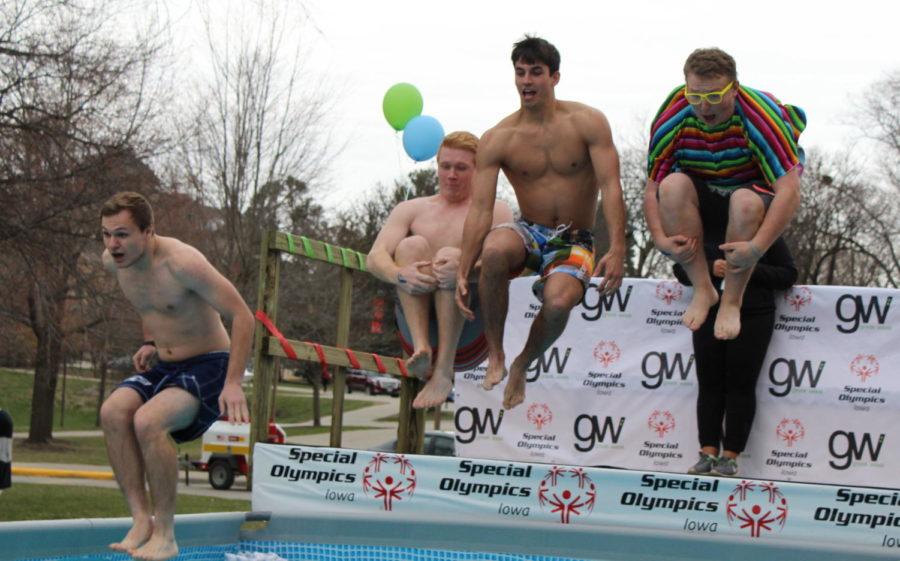Salo: Greeks: focus on the positive
Four fraternity brothers jump into the ice cold water during the Polar Plunge to benefit the Special Olympics outside of the Memorial Union on April 1. The Greek community together raised nearly $356,000 by the time the plunge started.
August 29, 2017
The greek community has attracted attention from both large and small scale, national and local news organizations. A simple Google search of “college greek life news” brings up a plethora of stories covering cases regarding hazing, excessive drinking and even some fraternity or sorority related deaths.
Rarely do these stories cover the positives of greek life such as philanthropy efforts and greek leadership. The topic of greek life tends to come up only after something has gone wrong in the community (yes, even in the Daily). Why is this?
If you’ve ever taken a journalism course, you know that one of the first things that journalism students learn is what makes a good story. Why will the audience want to read this story?
For those of you who haven’t, some of these aspects include timeliness, impact on the audience, proximity to the audience, if it involves a person of prominence and if it is a unique event. Another aspect that makes a good story is conflict. People love drama and prefer to read about people not getting along rather than hearing that everything is good.
So although many organizations in the greek community are giving their members great experiences with leadership, networking opportunities and holding successful philanthropy events, the media would rather cover how many times we’ve received consequences for drinking.
It’s not because all media hates the greeks – it’s because the media’s audience would rather read about the conflict between greeks and the law instead of the different leadership positions within a chapter.
So greeks, what can we do to get some positive coverage? Do something to grant us this coverage.
Philanthropy
It’s not enough to hold philanthropy events. In a greek community with over 60 chapters, there are many philanthropy events throughout the year. These events are not news unless they are unique in some way. A new approach to raising money, a new cause, a joint philanthropy or a philanthropy that raises an unusually large amount of money are just a few examples of how these events could receive positive media coverage.
Respect
Greek Week is a great opportunity for greeks to celebrate our organizations and represent ourselves positively. Last year, the Iowa State greek community raised over $370,000 for Iowa Special Olympics, which set the record for the largest amount of money donated by one organization. This resulted in positive media coverage.
But the positives were soon forgotten after members of the greek community booed, mocked and made racial remarks during the Vespers ceremony, an event that is meant to celebrate the entire greek community as a whole during Greek Week.
Comparing the page views of a story on record breaking fundraising versus a story on racial slurs, only 234 people read the Polar Bear Plunge story, while 3,896 people viewed the story on the Vespers incident.
Lawfulness
It’s not groundbreaking for me to tell you that if we don’t want negative coverage of greeks breaking laws, we should stop breaking laws.
Greeks are obviously not the only college students who drink or get in trouble for drinking, but when unaffiliated students get caught, they are usually the only ones to face consequences, unlike greeks whose chapters could also be held responsible.
It’s more newsworthy to cover when greeks get in trouble for drinking, but when the media covers the fact that we broke a law, we should respond in a remorseful fashion – acknowledge the mistake and make a plan to move past it.
As a greek student who also works with the media, I’d like to see more positive coverage of the greek community, but this cannot happen until less negative incidents and more impactful positive events occur.

















